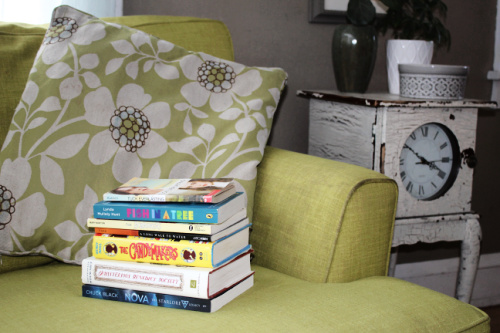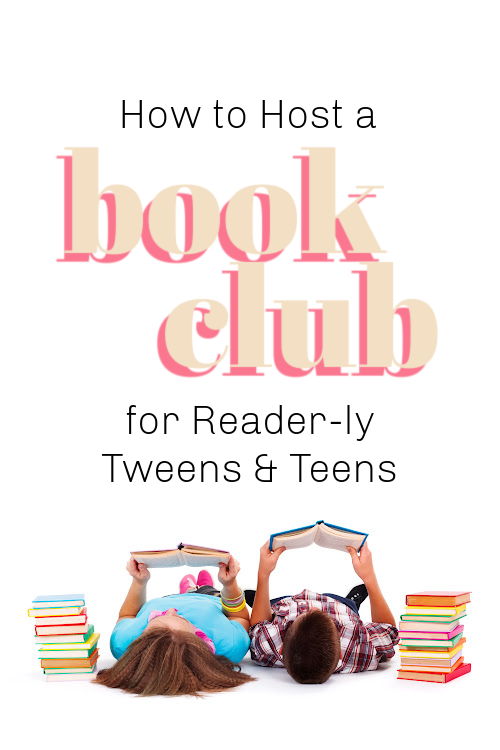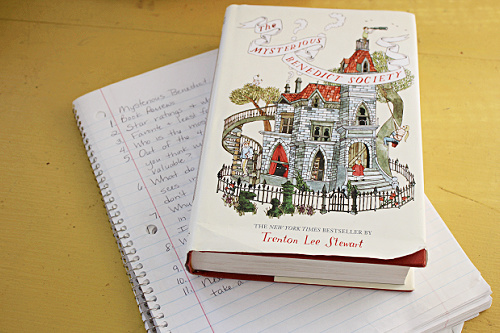I applaud those who host over-the-top book-ish gatherings complete with games, snacks, and crafts that coordinate with the themes of the book. I did that in our co-op for years because I found great value in building a shared experience around the pages of a book. I still do.
But, I also know that there are kids who already love to read and who find those kinds of book clubs distracting and superfluous. These are die-hard readers who read for the sheer pleasure of reading and who don't need any additional coercion or prodding to keep them at it.
These are kids who want to gather together to talk about books with others who also like to talk about books. That's it.
These are kids who want to gather together to talk about books with others who also like to talk about books. That's it.
I know these kids exist because I have one.
While all of my children like to read, my middle son loves it more than just about any other activity. At thirteen, though, he doesn't know many other tweens and teens who like books as much as he does. Two years ago, in an effort to help him find his people, I started a book club just for him filled with other story-formed kids.
This was, of course, at a time when the world had pretty much shut down. No one was meeting in person. Gatherings had to be done digitally or not at all. While I didn't love the idea of a ZOOM book club, I couldn't see any other alternative. I put out an invite on a few local homeschool Facebook groups being sure to emphasize that this was going to be a club for middle schoolers (kids between the ages of 11 and 14) who were already avid readers. This would not be a group for reluctant readers. I was also careful to mention that I was a Christian and that while the books I chose wouldn't necessarily be Christian fiction, I'd always lead the discussions with that worldview in mind.
It turns out, ZOOM was the perfect venue for the type of club my son was looking for. It allowed kids from outlying or remote areas around our town to be able to participate and didn't require any additional driving time for me. As restrictions began to lift, we kept meeting on a screen.
It's been two years and our group is still going strong. We have read some amazing books together like Watership Down and An Elephant in the Garden.
This was, of course, at a time when the world had pretty much shut down. No one was meeting in person. Gatherings had to be done digitally or not at all. While I didn't love the idea of a ZOOM book club, I couldn't see any other alternative. I put out an invite on a few local homeschool Facebook groups being sure to emphasize that this was going to be a club for middle schoolers (kids between the ages of 11 and 14) who were already avid readers. This would not be a group for reluctant readers. I was also careful to mention that I was a Christian and that while the books I chose wouldn't necessarily be Christian fiction, I'd always lead the discussions with that worldview in mind.
It turns out, ZOOM was the perfect venue for the type of club my son was looking for. It allowed kids from outlying or remote areas around our town to be able to participate and didn't require any additional driving time for me. As restrictions began to lift, we kept meeting on a screen.
It's been two years and our group is still going strong. We have read some amazing books together like Watership Down and An Elephant in the Garden.
Do we occasionally get together to watch the movie version of a book we happened to finish? Yes. Do we sometimes play a group mixer game or eat fun snacks when we gather in person? Sure. But the focus of our get-togethers whether in person or on a screen is never about the extras. It is always about the book. It's about helping tweens/teens develop a reading culture for themselves.
We read one book per month and meet twice a month to discuss it. Here is a peek at what our typical meetings look like.
Bookclub Meeting #1
Open Mic Book Reviews
We start with impromptu plugs for any non-bookclub books the kids have recently read and would like to recommend to others or forewarn them about. This open mic time has been a great way for the kids to learn the skills of sharing a brief synopsis without giving away the plot and the art of book-matchmaking. (Certain books, while good, aren't right for every reader. Book pairing is a skill that can be learned.)Star Ratings
After book reviews, I move on to the book we are currently reading together by inviting the kids to give it a rating from 1 to 5 stars. At this first meeting, we've only read half the book, often up to the conflict of the story. I tally all of our ratings and announce the overall book score, writing it down to be used during our second meeting of the month. Then I ask a few of the kids who gave really high or really low marks to tell us why they scored the book the way they did. They are to emphasize the word "because" as they are giving their answer.
I want the kids to understand that the most important part of any review--of a book, a movie, a game, a fill-in-the-blank--is the "because." When you use the word "because," you are saying why you like or don't like the book with helpful specificity. The reason you may not like a book might be the very reason someone else will love it and vice versa. In that way, a "bad" review really isn't bad. You are just admitting that the book wasn't right for you and helping others to make an educated decision about whether to pick it up for themselves based on their situation or preferences.
For example, my son loves The Lord of the Rings BECAUSE he appreciates the fantastical elements and world-building of the series. I happen to loathe both of those things in a book, so I know I'll never read anything by Tolkien (gasp!).
Discussion Questions
Next comes the part of our meeting that takes up the bulk of our time: the book discussion. Since this is the first of two meetings for a particular book, I only ask questions pertaining to the first half of the plot. (No one is allowed to read ahead.) These are questions that I've either come up with on my own after having read the book or questions that I've found on the internet after doing a google search for "Discussion question for ______________."
I try to pick open-ended questions that encourage the kids to share their opinions as opposed to questions that only have one right answer. I never want the book club to feel like a comprehension quiz.
For example, when discussing Charlotte's Web, instead of asking, "In the final scene, what words did the author use to describe Charlotte?" I'd ask, "When describing Charlotte in the last scene, the author said she was both a good friend and a good writer. How else would you describe her to someone who has never met her? What two words would you want someone to use when describing you?" (Charlotte's Web is obviously not a book I'd use in a book club for tweens/teens. I'm only including it here because it is a book you're probably familiar with.)
For example, when discussing Charlotte's Web, instead of asking, "In the final scene, what words did the author use to describe Charlotte?" I'd ask, "When describing Charlotte in the last scene, the author said she was both a good friend and a good writer. How else would you describe her to someone who has never met her? What two words would you want someone to use when describing you?" (Charlotte's Web is obviously not a book I'd use in a book club for tweens/teens. I'm only including it here because it is a book you're probably familiar with.)
Whenever I'm at a loss to come up with discussion questions, I always rely on these 10 questions that apply to any book.
I also encourage each of the kids to come to the meeting with one question they'd like to ask the group because again, the purpose of the club is to help them all develop a reading culture with others. Learning to ask good questions is an important part of learning to dialogue about books.
Bold Predictions
Since we've not read the second half of the book, we end our discussion by making bold predictions about how we think it will end or even how we hope it will end. The two are not always the same. I jot down a few of our guesses in order that we can revisit them at our next meeting.
Book Vote
To wrap up our meeting, we take a vote for the next month's title in order that everyone has enough time to find a copy of the book before needing to read it. I present three potential titles that I've previously vetted to the kids. I read the dust jacket descriptions and/or play a video book trailer that I've found on YouTube, using the ZOOM screen-share option so that everyone in the group can watch it. Then I ask the kids to cast their votes in the "comments" section to democratically decide which book we'll read the following month.
In this way, I'm ensuring that all the books are appropriate while also allowing the club members the chance to make the final decision. It's their club, after all. Should any parents, for whatever reason, have objections to the selected book, I immediately assign the kids to read one of the other books on my shortlist. (This has happened only once.)
Bookclub Meeting #2
Open Mic/Book Reviews
No one is required to share book reviews during our open mic. Sometimes several kids share and sometimes no one shares. Each of the kids tries to have their book of choice on hand to show the rest of the group. If they don't have the book ready, I pull a picture of it up on a shared screen. A really well-designed cover can often be the carrot that lures a kid into reading a particular book.
Star Ratings
As before, we give the book a star rating from 1 to 5. After tallying the ratings to determine its overall group score, we compare this star rating with the one we had given the book at the previous meeting when we had only read the first half. We then spend some time discussing why our opinions of the book had gone up or down. In this way, the kids begin to understand the following:
- a book can start out rather slowly and underwhelming, but end up being great or vice versa
- certain books don't end the way we hoped they would
- discussing a book you're currently reading with others can often change your perspective or opinion of certain characters or plot points
Discussion Questions
Like in the previous meeting, I rely heavily on open-ended questions, spending an extra amount of time on the kids' opinions of the ending of the book. I want to know...
- Did you like how the book ended? Why or why not?
- If you could change anything about the ending, what would you change?
- Do you think the author should write a sequel to this book and if so, what should it be about?
- What kind of reader would you recommend this book to?
- What other books does this one remind you of?
These are questions that will help them become discerning reviewers. They'll be able to determine which books to recommend to whom.
New Book Introduction
To close out our time, I say a few words about the next month's book. This is the title we selected during our last meeting. I double-check to make sure everyone has procured a copy of it, re-read the dust jacket synopsis aloud, and assign a stopping point. The kids know that by our next meeting, they are to read all the way to that point and no further.
A couple things you should know:
Our club only runs through the school year.
Each meeting is one hour long.
Before launching our first meeting in the fall, I put together a list of a dozen or so titles that I've vetted and will present to the kids in one or more of our votes. It's also helpful to have these gathered ahead of time to be able to share with prospective parents so that they know what types of books you'll be reading. (I'm currently in vetting season for next year's club and am listening to Glitch on the Libby app. I think it just might make the cut!)
The most challenging part of hosting this type of reader-ly book club is finding books that none of the members have read before. Since these are all kids who love to read, they are all very well-read. I have to dig deep to find clean, captivating, and largely unknown titles to recommend.
I keep a running list of books that I'm currently vetting or would like to vet on a Tween Bookclub GoodReads shelf and usually listen to them on audio before adding them to my curated list of potential titles. Feel free to follow (not "friend") me over there.
I've collected a list of my most favorite new-ish books for Middle Schoolers. These are books that we've either enjoyed as a family or in our bookclub.
Final Word
Two years ago, I started a tween/teen book club for my son and several other homeschooled middle schoolers in our area. Truth be told, I was a little worried about whether I'd have the time to fit our twice-a-month meeting into my life. But, it has turned out to be one of my favorite monthly commitments. It has given me a special connection to my son and has allowed me to foster a reading culture in the lives of some amazing kids.







You are amazing! Thanks for sharing this. I want to start a book club in my little corner of the world too.
ReplyDeleteThanks for reading!
Delete